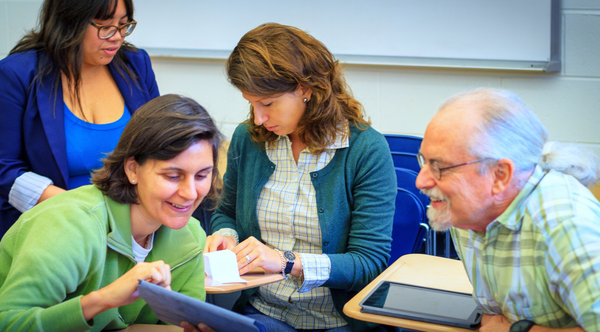What is a Formative Assessment?

When it comes to measuring and improving student learning, understanding the role of formative assessment is crucial. But what is a formative assessment? How does it differ from summative assessments, and why is it so essential in the learning process? Let's dive into what makes formative assessments unique, how they benefit both educators and students, and the strategies that make them effective.
Understanding Formative Assessment
Formative assessment is a type of evaluation used by teachers to monitor student learning during the instructional period. Unlike summative assessments, which evaluate student performance at the end of a course or unit, formative assessments are conducted throughout the learning process. These assessments are designed to provide instructors with actionable feedback, allowing them to adjust their teaching practices and support students in achieving their learning goals.
Formative assessments are an ongoing process, integral to helping students understand their progress and identify areas for improvement. The ultimate aim of formative assessment is to improve student learning by providing feedback that guides students forward in their educational journey.
Formative vs. Summative Assessments
To fully grasp the concept of formative assessment, it's essential to differentiate them from summative assessments. Summative assessments, such as final exams or standardized tests, measure learning at the end of an instructional period. Their primary purpose is to evaluate student achievement based on the intended disciplinary learning outcomes. These assessments are typically used to assign grades and determine if students have met the course outcomes.
On the other hand, formative assessments are used for formative purposes. They are integrated into the learning process to support students in improving their understanding and performance. Formative and summative assessments serve different functions but are both essential in the broader progression of student learning. While summative assessments focus on the end goal, formative assessments emphasize the ongoing process of learning.
The Importance of Formative Assessment in Student Learning
Formative assessment plays a critical role in enhancing student learning by providing students with the tools they need to succeed. When teachers use formative assessment strategies effectively, they help students become self-directed learners. This means that students are better equipped to take control of their own learning, self-assess their progress, and apply feedback to improve their performance.
One of the key benefits of formative assessments is that they encourage students to reflect on their learning. By analyzing evidence of their progress, students can identify areas where they need to adjust their learning strategies. This reflective process helps students understand not only what they have learned but also how they can improve moving forward.
Moreover, formative assessments provide teachers with valuable insights into student thinking. By evaluating student responses to various tasks, teachers can gauge how well students understand the material and where they may need additional support. This information allows teachers to make informed decisions about their instructional steps and adapt their teaching practices to better meet the needs of their students.
Formative Assessment Strategies
To maximize the benefits of formative assessment, it's important to employ a variety of strategies. Here are some effective formative assessment strategies that teachers can use in the classroom:
- Peer Feedback: Encourage students to provide feedback to one another on their work. Peer feedback allows students to see their learning from a different perspective and helps them understand the success criteria for the task.
- Self Assessment: Students should regularly self-assess their work against clear criteria. This practice helps students develop self-regulation skills and take ownership of their learning.
- Concept Maps: Have students create concept maps to represent their understanding of a topic visually. This formative assessment strategy helps teachers assess student understanding and provides students with a clear picture of their learning progress.
- Exit Tickets: At the end of a lesson, ask students to write one or two sentences summarizing what they learned or posing a question they still have. This simple strategy provides immediate feedback on student understanding and guides future instruction.
- Quizzes: Use short, low-stakes quizzes to assess student knowledge and provide feedback. These quizzes can clarify learning goals and ensure students are on track to meet their learning objectives.
- Think-Pair-Share: During class discussions, have students think about a question, discuss it with a partner, and then share their thoughts with the class. This strategy promotes student thinking and allows teachers to assess student responses in real time.
- Journals: Encourage students to keep journals where they reflect on their learning experiences. This ongoing process of reflection supports students in understanding their own learning and applying feedback to improve.
- Discussion: Engaging students in discussion allows teachers to gauge understanding and clarify misconceptions. This formative assessment strategy also encourages students to articulate their thoughts and engage with the material on a deeper level.
How Formative Assessments Improve Student Motivation and Success
Formative assessments have a profound impact on student motivation. When students receive specific, actionable, and timely feedback, they are more likely to feel motivated to improve. This feedback helps students understand what they need to do to succeed, which increases their confidence and encourages them to put in the effort required to achieve their goals.
Additionally, formative assessments help clarify learning goals and success criteria for students. When students understand what is expected of them, they can better focus their efforts on achieving those goals. This clarity is essential for student success, as it provides a roadmap for students to follow throughout their learning journey.
Formative assessments also contribute to student achievement by supporting students in developing effective learning strategies. By encouraging students to reflect on their learning and adjust their strategies as needed, formative assessments help students become more effective learners. This, in turn, leads to improved student performance and higher levels of student success.
Examples of Formative Assessments in Practice
To illustrate the power of formative assessment, let's explore some examples of formative assessments in action:
- A science teacher uses a concept map to assess student understanding of a complex process like photosynthesis. By analyzing the students' maps, the teacher can identify misconceptions and provide feedback to correct them.
- In a math class, students complete a self-assessment at the end of each unit, rating their understanding of key concepts. The teacher uses this information to identify students needing additional support before moving on to new material.
- An English teacher uses peer feedback during the writing process. Students exchange drafts and provide feedback based on clear criteria, helping each other improve their writing before submitting a final version.
- A history teacher uses exit tickets to gauge student understanding of a lesson on the causes of World War II. The teacher reviews the tickets and adjusts the next lesson to address any gaps in knowledge.
- In a higher education setting, an instructor uses quizzes to assess student understanding of course material. The instructor gives students feedback on their quiz results, helping them identify areas where they need to focus their studies.
Using an LMS for Formative Assessment
Learning management systems (LMS) like Canvas, Brightspace, Blackboard & Moodle can greatly enhance the effectiveness of formative assessment. These platforms streamline the assessment process, allowing teachers to create quizzes, distribute assignments, and provide instant, actionable feedback.
They also facilitate self-assessment and reflection, enabling students to track their progress and adjust their learning strategies in real time. At Atomic Jolt, we help educators create a more dynamic, personalized, and continuous learning environment with custom LMS development and add-ons, including formative assessment tools.
The Value of Formative Assessment
Formative assessment is a powerful tool for improving student learning. By providing timely, specific, and actionable feedback, formative assessments help students understand their progress and identify areas for improvement. This ongoing process not only supports students in achieving their learning goals but also enhances their motivation and engagement in the learning process.
Formative assessments are essential for both teachers and students. For teachers, they provide valuable insights into student understanding, allowing them to adjust their teaching practices and support students more effectively. For students, formative assessments encourage reflection, self-assessment, and the development of effective learning strategies, all of which contribute to their success.
Ultimately, the combination of formative and summative assessment practices ensures that students are not only evaluated on their final performance but are also supported throughout their learning journey. By incorporating formative assessment strategies into their teaching, educators can help students become self-directed learners who are well-prepared to achieve their academic goals.



